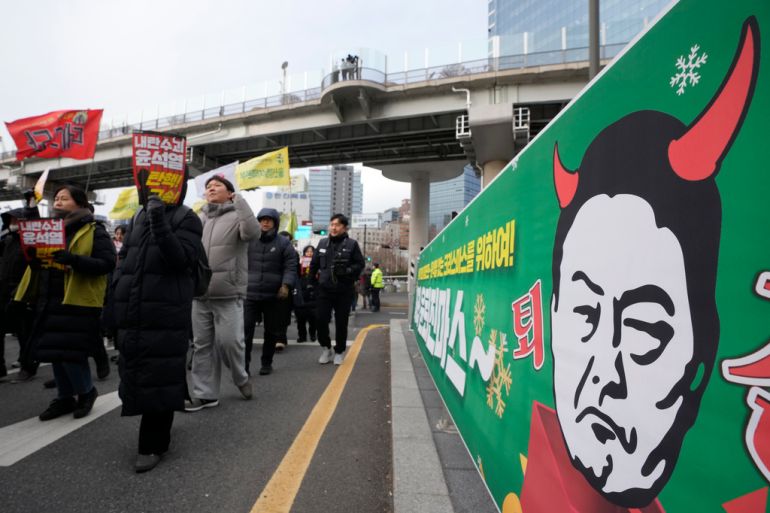EXPLAINER
Will South Korea’s President Yoon survive second impeachment motion?
The stakes are high for President Yoon Suk-yeol as the opposition tries again to impeach him for declaring martial law.
Protesters march to the presidential office after a rally demanding South Korean President Yoon Suk-yeol’s impeachment in Seoul, South Korea, on Thursday [Ahn Young-joon/AP Photo]By Musun KimPublished On 14 Dec 202414 Dec 2024
Seoul, South Korea – South Korean President Yoon Suk-yeol is set to face a second impeachment motion in the National Assembly on Saturday, just a week after a previous attempt by the political opposition fell short.
The stakes are high following Yoon’s controversial declaration of martial law on December 3, which triggered nationwide protests and heightened uncertainty for Asia’s fourth-largest economy.
For the latest impeachment motion to succeed, it must secure at least 200 votes – a two-thirds majority – in South Korea’s 300-seat National Assembly.
The opposition bloc holds 192 seats, leaving it eight votes short of the number required.
However, in recent days, a small yet growing number of legislators from Yoon’s governing People Power Party have openly supported the motion, making impeachment increasingly more likely.
In a defiant televised address on Thursday, Yoon dismissed the idea of voluntary resignation, stressing, “Whether they impeach me or investigate me, I will stand firm.”
Advertisement
What happens if Yoon is impeached?
If the National Assembly passes the impeachment motion, a series of legal and constitutional processes will unfold, starting with the official delivery of the impeachment resolution from the National Assembly to the President’s Office and the Constitutional Court.
From that moment, Yoon’s presidential powers will be suspended. He will still retain the title and some privileges associated with the presidency, including the presidential residence, and continued security protection.
During this period, South Korea’s prime minister will assume the role of acting president under Article 71 of the Constitution.
However, the opposition is also considering impeaching Prime Minister Han Duck-soo in connection with his possible role in the martial law declaration. If Han is impeached, too, the deputy prime minister for the economy would take over as acting president.
The acting president will handle essential duties such as military command, issuing decrees, and managing state matters.
While the Constitution does not clearly limit the scope of an acting president’s authority, precedent suggests powers should be limited to maintaining the status quo rather than initiating major policy changes.
Review at the Constitutional Court
The impeachment process then moves to the Constitutional Court, where justices will review the case to determine whether Yoon’s removal is justified.
At least six out of the nine justices must support the motion for it to be upheld.
Advertisement
However, only six justices currently sit on the bench, meaning Yoon needs just one supportive ruling to survive the impeachment attempt.
The three vacant seats are positions that the National Assembly can nominate. While legislators are now rushing to fill those seats, the president has the final authority to approve the appointments, raising the possibility of delays or rejections.
The court is required to issue its decision within 180 days of receiving the case. The Constitutional Court took 63 days to rule on former President Roh Moo-hyun’s impeachment in 2004 and 91 days for former President Park Geun-hye’s case in 2016.
South Korea’s removed President Park Geun-hye arrives at a court in Seoul, South Korea, in August 2017 [File: Kim Hong-ji/Reuters]
Yoon’s potential legal defence
Yoon’s speech on Thursday appeared to preview his defence strategy should the case reach the Constitutional Court.
He is likely to argue that declaring martial law was within his constitutional powers and did not constitute an illegal act or an insurrection.
He framed the martial law declaration as a “highly political decision” falling under the president’s powers, which are “not subject to judicial review”.
Yoon insisted that his decision was an “emergency appeal to the public” amid what he described as a severe political crisis, which he blamed on the opposition-controlled National Assembly.
Constitutional Court’s ruling
If the court upholds the impeachment, Yoon will be removed from office.
Advertisement
He will lose privileges afforded to former presidents, such as pensions and personal aides, though he will continue to receive security protection.
A presidential election must then be held within 60 days to elect a new leader.
If the impeachment is rejected, Yoon will be reinstated as president and resume his duties.
Separate investigations
Even if he survives the second impeachment bid, Yoon still faces criminal investigations.
Although a sitting president enjoys immunity from criminal prosecution, this protection does not extend to charges of insurrection.
Multiple investigative agencies, including the police, the prosecution, and the Corruption Investigation Office for High-ranking Officials, are investigating senior officials and military commanders on charges of insurrection.
This means that Yoon could potentially be arrested, which would mark the first such case involving a sitting president in South Korea.
